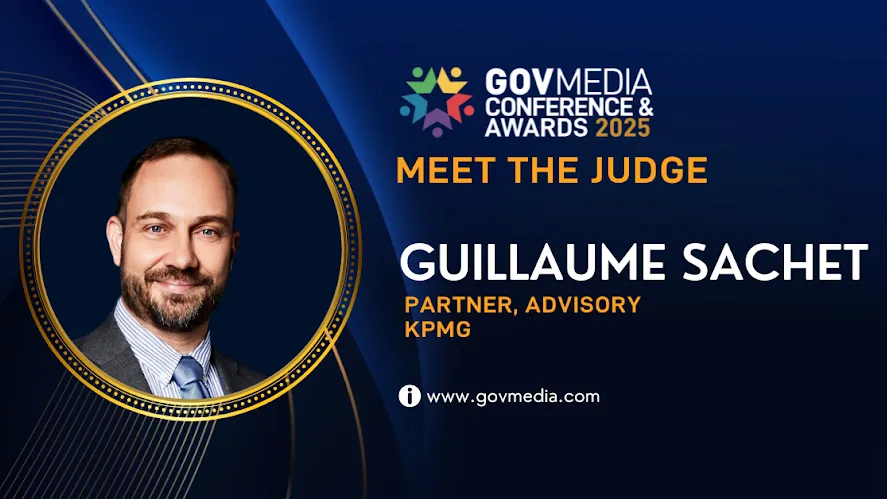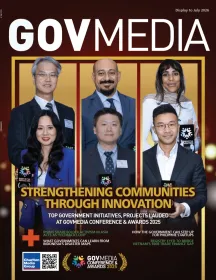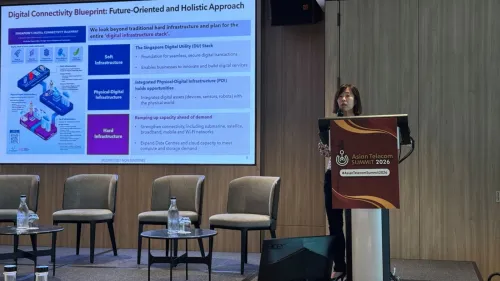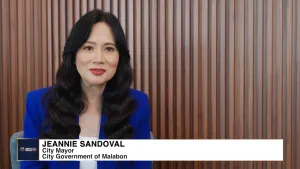
KPMG’s Guillaume Sachet emphasises building public trust to drive digital transformation
He discussed the role of AI and citizen-centric strategies in enhancing government services.
As governments across the Asia Pacific region accelerate digital transformation, they face increasing expectations to deliver citizen-centric services whilst ensuring operational efficiency, inclusivity, and trust. To succeed, they must embrace emerging technologies, build agile workforces, and foster meaningful public engagement.
Guillaume Sachet, Partner at KPMG’s Advisory practice in Singapore, shared key strategies and insights to help the public sector navigate an increasingly complex digital landscape. With close to 30 years of experience in the technology industry, he brings deep expertise in digital transformation and customer experience, built over an extensive career across the Asia-Pacific region.
Having spent more than two decades in Asia, Sachet has worked in diverse markets including Singapore, Thailand, Malaysia, Indonesia, Australia, Brunei, Vietnam, Philippines, Korea and China. He is widely recognised as a thought leader in the tech sector, frequently contributing to industry discourse through speaking engagements and written insights. To date, he has authored over 20 articles and white papers on technology and innovation for various organisations and publications.
As a judge at the GovMedia Conference & Awards 2025, Sachet discussed how governments can drive citizen trust and operational excellence by embracing responsible innovation, AI adoption, and citizen-centric digital transformation.
As governments across Asia-Pacific accelerate digital transformation, what key factors should they prioritise to enhance citizen services and operational efficiency?
To drive digital adoption, governments across Asia Pacific must foster public trust. KPMG’s recent publication, “Embrace your digital citizen,” identifies two pillars of customer experience excellence—personalisation and empathy—that are crucial for building this trust.
Personalisation involves collecting and safeguarding robust data to provide tailored services, making citizens feel unique at every touchpoint with government services. It allows citizens to choose their preferred channels based on their demographics and psychographics. For example, Gen Z might favour mobile-enabled channels whilst senior citizens opt for more human-enabled ones. Seamless omnichannel services enhance operational efficiency by reallocating human resources where they add the most value to citizens.
Empathy means ensuring inclusivity, respect, and care by focusing on “moments” rather than interactions. Governments must maintain a human touch for complex, sensitive issues to reassure citizens and build deep rapport.
Beyond these pillars, governments can make a significant impact by prioritising first-point resolution and proactively informing citizens. Firstly, governments can ensure that issues are resolved at the first contact. This reduces reliance on traditional and expensive channels, thus cutting costs, enhancing efficiency and convenience for citizens. Secondly, keeping citizens updated through digital channels reduces the need for them to reach out for information, alleviating concerns and leading to fewer contacts and smoother interactions overall.
Given your expertise in customer experience, what best practices can government organisations adopt to improve citizen engagement and satisfaction?
Today’s big trend is artificial intelligence (AI). There is a digital “acceler-AI-tion” across all sectors driven by the evolution of AI models—from AI to Gen AI to Agentic AI—giving ever-increasing autonomy to AI agents. AI has the potential to improve citizens’ experiences in many ways—from data analysis to fraud detection and prevention, from medical research to emergency response, from environmental monitoring to traffic management, and even for predictive policing.
However, successfully adopting AI to improve citizen engagement and satisfaction whilst maintaining trust requires that governments using it implement governance best practices and ethical standards. According to KPMG's “From smart to smarter cities”, data privacy, copyrighting, and data governance are important. This makes data management and data quality crucial, with data secure and integrated before use of the cloud and sophisticated AI models. Governments must also ensure their AI models are sound and have been tested with sufficient volumes of data, and that they are constantly learning and improving.
With increasing investments in smart cities, what are the most impactful ways governments can leverage technology to enhance urban living?
Governments should adopt a systems-thinking approach rather than implementing isolated technological fixes within smart city initiatives. This means recognising that urban elements are interconnected, for example, transportation influences energy consumption, or public services impact citizens’ health. By considering these interdependencies, as Singapore has done with its integrated Geospatial Master Plan, governments can develop more effective interventions that produce better outcomes for urban living.
A key factor in the success of smart city initiatives is leveraging the real-time data-richness offered by smart technologies and the Internet of Things. This is crucial because historical data may not accurately reflect current urban dynamics. Harnessing real-time information and managing and integrating it securely are essential for building trust and ensuring interoperability.
To enable such technologies, it is critical to move to cloud solutions. Once data is moved to the cloud, governments can start experiencing the myriad benefits this model provides—for example, disaster recovery, flexibility, greater speed of business, and significant cost savings over the longer term. KPMG's research shows 40% of governments that responded consider public cloud systems as one of the most important technologies for their short-term ambitions, compared to 30% across other sectors. Public cloud solutions in use already help to drive citizen engagement and save time by automatically securing, refreshing and backing up data, and by keeping systems updated. This explains why many governments plan to maximise the number of applications they migrate to the cloud. For example, Singapore is supporting cloud solutions integration with its Government on the Commercial Cloud initiative.
At the same time, governments must maintain stringent cybersecurity by constantly updating their policies and adopting clear incident-response plans and zero-trust models, which involve continuous monitoring, third-party risk management, and cloud security. As KPMG’s Global Tech 2023 report found, most government and public sector respondents believe their tech function already plays an instrumental role in building resilience and meets increasingly demanding regulations.
What strategies can public sector organisations adopt to build a more agile and responsive workforce capable of meeting changing citizen needs?
To build a more agile and responsive workforce capable of meeting citizens’ changing needs, public sector organisations should adopt three key strategies, as highlighted in KPMG’s Global Tech Report: Government and public sector insights. These strategies include investing in the workforce, training programmes, and communication.
Invest in workforce: The public sector can seamlessly integrate cutting-edge solutions and the specialised knowledge necessary for accelerated innovation and digital transformation by with a twin approach: Enhance talent acquisition strategies to attract top-tier technology professionals, who inject fresh expertise and innovation in public sector organisations, whilst fostering strategic partnerships with private technology companies. Enhanced recruiting programmes can help attract sought-after resources and enable the public sector to compete for technology talent—a proactive approach that can accelerate organisational agility and enhance responsiveness to constituents’ needs.
Invest in training programmes: Governments should invest in training programmes to enhance workforce skills and promote adaptability. Comprehensive upskilling programmes, such as micro-credentialling for skillsets in emerging areas (e.g., data science and AI), as proposed in KPMG’s Singapore Budget 2025 recommendations, can elevate the digital literacy of current employees. This empowers the public sector workforce to embrace a culture of continuous learning and effectively navigate evolving technological landscapes. Furthermore, this approach can also ensure employees have multidisciplinary skillsets spanning, for example, technology, public administration, and urban planning—in the process equipping officials with intersectional insights that can produce innovation and new ways of working. Strategic collaboration with organisations outside the public sector, such as institutes of higher learning and companies with a strong footprint in the necessary skillsets, can also unlock ways of sharing knowledge whilst upskilling and broadening the expertise of internal government staff.
Invest in communication: Transparently addressing evolving citizen needs by disseminating relevant research further empowers staff to proactively address public demands and anticipate future requirements, fostering a culture of adaptability and responsiveness.
As technology continues to evolve, how can government organisations ensure inclusivity and equitable access to digital services?
According to KPMG’s Perspective on the AI Blueprint for Intelligent Economies, an intelligent economy leverages AI for growth, ensuring inclusivity through equitable technology access, education, opportunities, and fostering innovation whilst aiming to reduce disparities. To achieve this, access to digital services, governments must take three key steps.
Firstly, upgrading infrastructure is essential. Governments need to invest in power grids, data centres, modern digital networks, and devices to ensure the benefits of AI are widely accessible. High-quality data is crucial for developing, training, and fine-tuning unbiased AI models. Private sector AI investments can power a thriving AI ecosystem, complementing public sector funds and efforts.
Secondly, developing intelligent industries is important. As AI becomes increasingly embedded in all aspects of our lives, from application workflows, physical devices and robotics, it is expected to have a profound impact across multiple sectors and industries, including agriculture, healthcare, manufacturing, and beyond. This integration will drive significant advancements and efficiencies in these fields.
Lastly, placing people and trust at the centre is vital. AI has the potential to significantly elevate human potential and improve quality of life, removing obstacles to obtaining knowledge whilst automating many manual and repetitive tasks. Robust ethical and regulatory frameworks for AI are essential to help ensure it benefits society whilst reducing the risks of misuse, bias, ethical breaches, and security risks. Prioritising these frameworks will enable governments to build trust and ensure that AI serves the public good.
As a judge at the GovMedia Conference & Awards 2025, what key attributes or success factors will you be looking for in the nominated projects?
2025 will see governments being at the forefront of innovation, embracing new technologies such as Agentic AI whilst ensuring responsible AI and ethical standards. This approach not only enhances citizens’ experiences but also ensures empathy remains a key pillar of their initiatives.
Collaboration with the private sector is essential. Governments should also continue to actively partner with private enterprises to co-create transformative experiences that leverage the strengths and innovations of both sectors.
Furthermore, enabling startups and entrepreneurs to thrive is crucial for developing a vibrant ecosystem. Governments should provide support and resources to these innovators, encouraging fresh ideas and cutting-edge technologies.
As a judge at the GovMedia Conference & Awards 2025, I will be looking for projects that embody these principles. Ultimately, the projects that stand out will be those that have a profound and positive impact on citizens' lives, driving forward the vision of a smarter, innovative, and more sustainable future.













